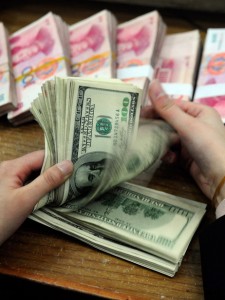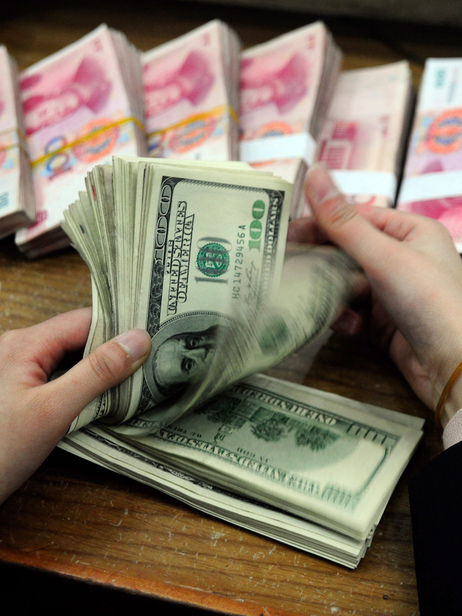
(AFP Photo)
Bankers have indicated that the recent rise in the cost of the US dollar to over EGP 7.25 is a temporary crisis which will soon be remedied through the use of flexible controls available to the Central Bank.
Ahmed Al-Kholy, Manager of Treasury Banking Department at the Housing and Reconstruction Bank, explained the current rate hike on increased imports is related to the Christmas holiday as well as currency speculation on the black market.
El-Kholy further highlighted that the supply of dollars may not meet demand, however he indicated that the Central Bank will be able to manage the situation. Al- Kholy referred to positive indicators such as the increase in foreign exchange reserves, in order to allay fears driving speculation in the dollar market.
“The waiting lists are still there and did not disappear since the start of 2013, and clients requests are fulfilled through the periodic dollars auctions funding the banks needs” according to Al-Kholy.
The black market exchange rate exceeds the official rate by as much as 6%.
The Central Bank pumps nearly $120 million a week through periodic auctions, to serve banks’ need for dollars and to cover importers’ requirements to pay for their letters of credit.
The US/EGP exchange rate was stable in July following assistance packages from the Gulf amounting to $12bn. However the Egyptian pound depreciated nearly 11.3% against the US dollar since the start of the weekly auctions on 31 December 2012, while the US dollar interbank rate reached EGP 6.88.
In the same context, Tamer Sadek, Manager of the Treasury Banking Department in Egypt-Iran for Development said that “following the 30 June Revolution, the dollar depreciated in parallel to the Egyptian pound.”
Sadek blamed the current instability in the currency market on political forces, stating that the crisis has been orchestrated “by religious movements that do not want Egypt to stabilise” and who have sabotaged the country through predatory currency speculation .
Sadek indicated that current US dollar waiting lists differ from those under Morsi’s rule as they are grounded in strong client demand. The regularity of auctions, he said, reflect a stable and accessible trade process, while previously auctions had been based on a shortage of dollars. Auctions are now held “every two to three days, when previously the dollar shortage only allowed for monthly or bi-monthly auctions.”
“The Central Bank does not need to pump larger amounts in its auctions since the current supply can meet clients’ needs,” Sadek added.
Sadek predicted a speedy depreciation in the dollar’s exchange rate in the coming period due to the relative stability of the current market.
Haitham Abd Al-Fattah, head of Treasury Banking in the Egyptian Industrial Development and Workers Bank, stressed that the Central Bank did not issue any instructions to tighten the supply of dollars to clients.
Al-Fattah further stipulated that banks exchange dollars to all clients based on need, since they always intend to reflect the needs of key clients in allocating available resources.
Khaled Abd Al-Hamid, a treasury official in a private bank, claimed that the current appreciation of the dollar would not last long, describing the rise as “sudden.”
Al-Hamid points out that the Central Bank was able through several exceptional auctions to limit the role of the black market. He indicated that “banks try to provide all foreign currencies to clients” further stressing the lack of imposed controls on the distribution of dollars. Al-Hamid highlighted the efforts of all banks to end their waiting lists and assessed the situation as “normal.”
Al-Hamid stated that increased liquidity at key banks allowed the demand for dollars to be met in many cases and waiting lists to be greatly reduced as well as for the banks to address a large portion of their letters of credit.
This announcement comes simultaneously to the Central Bank’s announcement for all Egyptian banks to follow facilitative procedures when transferring dollars abroad beginning next year.
Central Bank officials further highlighted the need for banks to be more flexible when dealing with clients having monetary obligations abroad, such as medication or tuition for family members, by making additional currency reserves available, in accordance with current policy and procedure.
Al-Hamid further emphasised the differences between these immediate needs and importers letters of credit; however he emphasised the need for banks to meet any demand for dollars in order to “abolish the black market”
He added that tightening transfers burden the financial sector and efforts to serve and assist clients, describing the Central Bank’s request as a “necessity in increasing flexibility of transfers” and indicated that the long standing policies were in the best interest of the Egyptian people.




